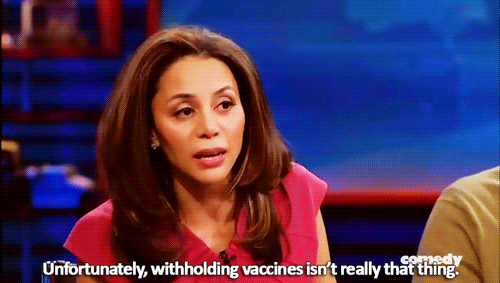#autism
Hi just letting y’all know that Sia, the artist, is making what is essentially a big “F you” to autistic people. She is collaborating with Autism Speaks which is an organization that believes autism is something to be cured and treats autistic people like burdens. It is another run of the mill inspiration p**n movie for non autistic people and able bodied people to feel like they have compassion and understanding for us. For any of you who are not autistic and are able bodied, please do not support this film as it perpetuates bad stereotypes about autism and disabled individuals.
The fact that she used a neurotypical actress to represent a neurodivergent character definitely isn’t great, but on its own it really isn’t the end of the world.
But her rude responses to people being upset? Her shitty treatment to her autistic fans? Her shitty treatment to Maddie, the actress who was uncomfortable with her role? Her partnering with fucking Autism Speaks? Absolutely disgusting. Straight ableism.
Try harder.
I queued this a little while ago so I feel that I should add that Autism Speaks themselves put out a disclaimer saying they had no part in what Sia did and disagree with her actions.
The god awful ableist hate group is doing better than her. That’s low.
Hi just letting y’all know that Sia, the artist, is making what is essentially a big “F you” to autistic people. She is collaborating with Autism Speaks which is an organization that believes autism is something to be cured and treats autistic people like burdens. It is another run of the mill inspiration p**n movie for non autistic people and able bodied people to feel like they have compassion and understanding for us. For any of you who are not autistic and are able bodied, please do not support this film as it perpetuates bad stereotypes about autism and disabled individuals.
The fact that she used a neurotypical actress to represent a neurodivergent character definitely isn’t great, but on its own it really isn’t the end of the world.
But her rude responses to people being upset? Her shitty treatment to her autistic fans? Her shitty treatment to Maddie, the actress who was uncomfortable with her role? Her partnering with fucking Autism Speaks? Absolutely disgusting. Straight ableism.
Try harder.
legimate autistic trans person: this mogai shit, especially neurogenders and your “autigender”, harms us
some cis kid: lmao mean gatekeeper
Me, neurodivergent and nonbinary: neopronouns arent necessary and saying that people like me “need” them to “properly express” our gender makes us out to be dumb toddlers.
Some cisgender neurotypical: you’re ableist >:((((
Autistic kids who best peers at math show different brain organization
Children with autism and average IQs consistently demonstrated superior math skills compared with nonautistic children in the same IQ range, according to a study by researchers at the Stanford University School of Medicine and Lucile Packard Children’s Hospital.
“There appears to be a unique pattern of brain organization that underlies superior problem-solving abilities in children with autism,” said Vinod Menon, PhD, professor of psychiatry and behavioral sciences and a member of the Child Health Research Institute at Packard Children’s.
The autistic children’s enhanced math abilities were tied to patterns of activation in a particular area of their brains — an area normally associated with recognizing faces and visual objects.
Menon is senior author of the study, published online Aug. 17 in Biological Psychiatry. Postdoctoral scholar Teresa luculano, PhD, is the lead author.
Children with autism have difficulty with social interactions, especially interpreting nonverbal cues in face-to-face conversations. They often engage in repetitive behaviors and have a restricted range of interests.
But in addition to such deficits, children with autism sometimes exhibit exceptional skills or talents, known as savant abilities. For example, some can instantly recall the day of the week of any calendar date within a particular range of years — for example, that May 21, 1982, was a Friday. And some display superior mathematical skills.
“Remembering calendar dates is probably not going to help you with academic and professional success,” Menon said. “But being able to solve numerical problems and developing good mathematical skills could make a big difference in the life of a child with autism.”
The idea that people with autism could employ such skills in jobs, and get satisfaction from doing so, has been gaining ground in recent years.
The participants in the study were 36 children, ages 7 to 12. Half had been diagnosed with autism. The other half was the control group. Each group had 14 boys and four girls. (Autism disproportionately affects boys.) All participants had IQs in the normal range and showed normal verbal and reading skills on standardized tests administered as part of the recruitment process for the study. But on the standardized math tests that were administered, the children with autism outperformed children in the control group.
After the math test, researchers interviewed the children to assess which types of problem-solving strategies each had used: Simply remembering an answer they already knew; counting on their fingers or in their heads; or breaking the problem down into components — a comparatively sophisticated method called decomposition. The children with autism displayed greater use of decomposition strategies, suggesting that more analytic strategies, rather than rote memory, were the source of their enhanced abilities.
Then, the children worked on solving math problems while their brain activity was measured in an MRI scanner, in which they had to lie down and remain still. The brain scans of the autistic children revealed an unusual pattern of activity in the ventral temporal occipital cortex, an area specialized for processing visual objects, including faces.
“Our findings suggest that altered patterns of brain organization in areas typically devoted to face processing may underlie the ability of children with autism to develop specialized skills in numerical problem solving,” Iuculano said.
“These findings not only empirically confirm that high-functioning children with autism have especially strong number-problem-solving abilities, but show that this cognitive strength in math is based on different patterns of functional brain organization,” said Carl Feinstein, MD, director of the Center for Autism and Related Disorders at Packard Children’s and professor of psychiatry and behavioral sciences at the School of Medicine. He was not involved in the study.
Menon added that previous research “has focused almost exclusively on weaknesses in children with autism. Our study supports the idea that the atypical brain development in autism can lead, not just to deficits, but also to some remarkable cognitive strengths. We think this can be reassuring to parents.”
The research team is now gathering data from a larger group of children with autism to learn more about individual differences in their mathematical abilities. Menon emphasized that not all children with autism have superior math abilities, and that understanding the neural basis of variations in problem-solving abilities is an important topic for future research.
(Image: Corbis)
Post link
A new study in Biological Psychiatry explores the influence of oxytocin
Difficulty in registering and responding to the facial expressions of other people is a hallmark of autism spectrum disorder (ASD). Relatedly, functional imaging studies have shown that individuals with ASD display altered brain activations when processing facial images.
The hormone oxytocin plays a vital role in the social interactions of both animals and humans. In fact, multiple studies conducted with healthy volunteers have provided evidence for beneficial effects of oxytocin in terms of increased trust, improved emotion recognition, and preference for social stimuli.
This combination of scientific work led German researchers to hypothesize about the influence of oxytocin in ASD. Dr. Gregor Domes, from the University of Freiburg and first author of the new study, explained: “In the present study, we were interested in the question of whether a single dose of oxytocin would change brain responses to social compared to non-social stimuli in individuals with autism spectrum disorder.”
They found that oxytocin did show an effect on social processing in the individuals with ASD, “suggesting that oxytocin may help to treat a basic brain function that goes awry in autism spectrum disorders,” commented Dr. John Krystal, Editor of Biological Psychiatry.
To conduct this study, they recruited fourteen individuals with ASD and fourteen control volunteers, all of whom completed a face- and house-matching task while undergoing imaging scans. Each participant completed this task and scanning procedure twice, once after receiving a nasal spray containing oxytocin and once after receiving a nasal spray containing placebo. The order of the sprays was randomized, and the tests were administered one week apart.
Using two sets of stimuli in the matching task, one of faces and one of houses, allowed the researchers to not only compare the effects of the oxytocin and placebo administrations, but also allowed them to discriminate findings between specific effects to only social stimuli and non-specific effects to more general brain processing.
What they found was intriguing. The data indicate that oxytocin specifically increases responses of the amygdala to social stimuli in individuals with ASD. The amygdala, the authors explain, “has been associated with processing of emotional stimuli, threat-related stimuli, face processing, and vigilance for salient stimuli”.
This finding suggests oxytocin might promote the salience of social stimuli in ASD. Increased salience of social stimuli might support behavioral training of social skills in ASD.
These data support the idea that oxytocin may be a promising approach in the treatment of ASD and could stimulate further research, even clinical trials, on the exploration of oxytocin as an add-on treatment for individuals with autism spectrum disorder.
Neural Network Model Shows Why People with Autism Read Facial Expressions Differently
People with autism spectrum disorder have difficulty interpreting facial expressions.
Using a neural network model that reproduces the brain on a computer, a group of researchers based at Tohoku University have unraveled how this comes to be.
The journal Scientific Reports published the results.
“Humans recognize different emotions, such as sadness and anger by looking at facial expressions. Yet little is known about how we come to recognize different emotions based on the visual information of facial expressions,” said paper coauthor, Yuta Takahashi.
“It is also not clear what changes occur in this process that leads to people with autism spectrum disorder struggling to read facial expressions.”
The research group employed predictive processing theory to help understand more. According to this theory, the brain constantly predicts the next sensory stimulus and adapts when its prediction is wrong. Sensory information, such as facial expressions, helps reduce prediction error.
The artificial neural network model incorporated the predictive processing theory and reproduced the developmental process by learning to predict how parts of the face would move in videos of facial expression. After this, the clusters of emotions were self-organized into the neural network model’s higher level neuron space - without the model knowing which emotion the facial expression in the video corresponds to.
The model could generalize unknown facial expressions not given in the training, reproducing facial part movements and minimizing prediction errors.
Following this, the researchers conducted experiments and induced abnormalities in the neurons’ activities to investigate the effects on learning development and cognitive characteristics. In the model where heterogeneity of activity in neural population was reduced, the generalization ability also decreased; thus, the formation of emotional clusters in higher-level neurons was inhibited. This led to a tendency to fail in identifying the emotion of unknown facial expressions, a similar symptom of autism spectrum disorder.
According to Takahashi, the study clarified that predictive processing theory can explain emotion recognition from facial expressions using a neural network model.
“We hope to further our understanding of the process by which humans learn to recognize emotions and the cognitive characteristics of people with autism spectrum disorder,” added Takahashi. “The study will help advance developing appropriate intervention methods for people who find it difficult to identify emotions.”
997:
i’m crying i’m crying i’m crying
KID’S A FELLOW FONT NERD
I can’t even express how amazing this is to me holy shit
I was feeling weird about how fast my brain was like “this kid is 100% autistic” but according to the notes I was correct. So.
Who is more utterly in love with the details of the world than an autistic kid?

With more children getting diagnosed as autistic there’s more and more parents realizing that they’re also autistic. It’s a beautiful thing.
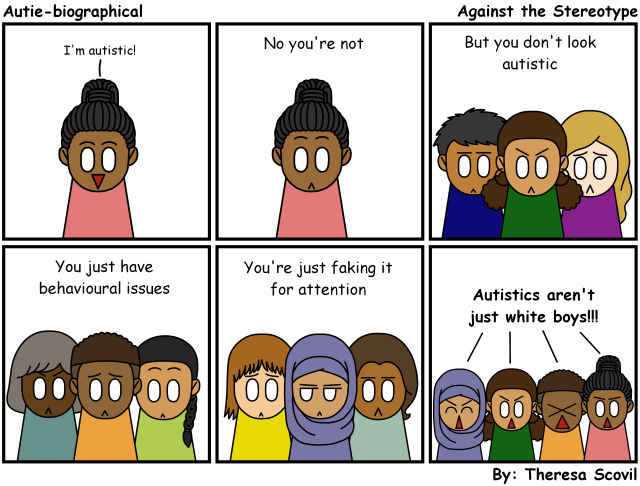
POCs and women are statistically less likely to be diagnosed as autistic. This not only means that they have a harder time getting a diagnosis, but they’re also less likely to be believed by the general public.
This is so harmful, and needs to stop!

Masking isn’t a manipulation tactic, it’s a shield, and one that I hope I can put down for good some day.

I feel that imposter syndrome within the autistic community is so common. We’re constantly told “you don’t look autistic” that sometimes we believe it. It’s okay though. You’re not alone in feeling this. Don’t listen to those doubts, and embrace your autistic self!
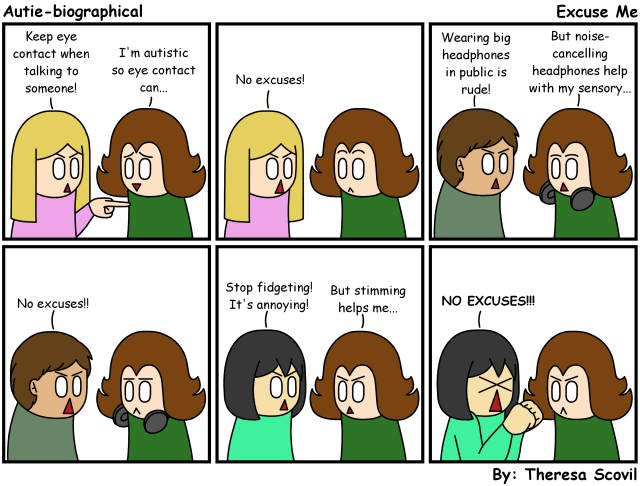
April is Autism Acceptance month! You want to be accepting? You want to be supportive? Be accommodating.
People will say they accept autism, and then berate us for being autistic. Don’t tell us you accept us when you regularly punish us for being ourselves.
When I get insulted by people whose opinions don’t matter to me I can shrug it off pretty easily.
When a loved one gets insulted by ANYONE I’m ready to throw down, Canadian style!

And this is one reason why I still wear a mask when I go out. I never know when a random coughing fit may happen simply because I suck at swallowing my own spit.

I verbally stim when I’m really happy. People used to bully me for it so I learned to be ashamed of it. Now, years later, my partner has helped me unlearn that shame, and embrace my verbal stims.
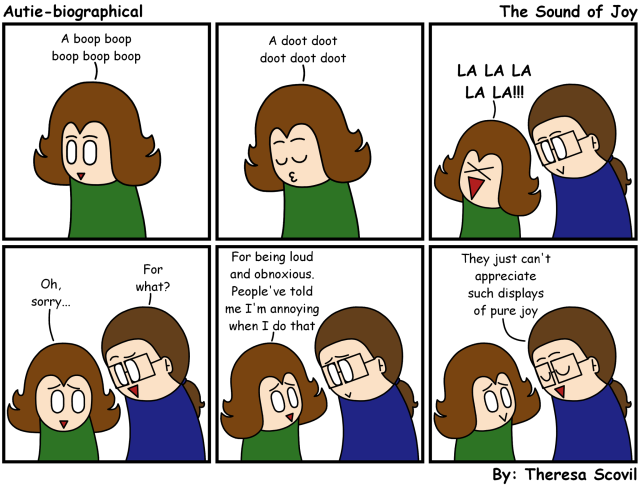

I hate going to the dentist so much! I had a gap between two of my molars that made it so I couldn’t chew on the right side of my mouth for 2 ½ years before finally getting it fixed. That’s how much I avoid the dentist.
No hate towards dentists though. You do important work, and I respect that.
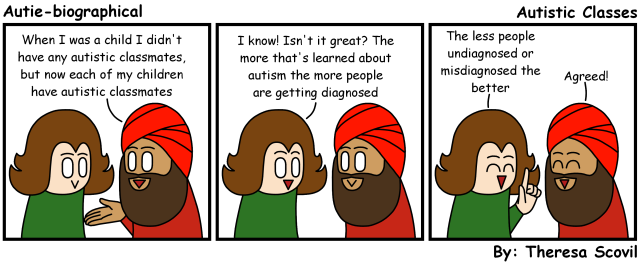
More people getting diagnosed, especially when they’re still children, is a good thing! This isn’t an epidemic. This isn’t over-diagnosing. This is more and more autistic people being properly diagnosed.

Functioning labels are a common way autistic people are denied support.
High functioning? You’re fine without support. Low functioning? You’re not high functioning enough to determine whether you need support or not.

I’ve been accused of being in a hate group, as well as a cult, all because of my advocacy.




